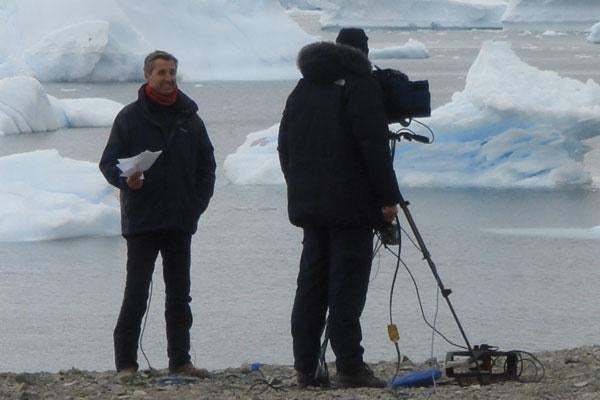
You’d expect conditions to be difficult, working in the Antarctic, what with the wind, extreme temperatures and all. But you don’t really expect the scheduled airline to cause problems before even getting to the continent.
Just getting our kit to Antarctica was an adventure. The satellite dish we were using to anchor the live ITV News weighed 650kg and measured 2.4m in diameter. It reached the Falkland Islands via the RAF and was waiting for HMS Endurance to collect it and get it to Antarctica. But our second shipment, travelling via Chile to the Falklands, had been offloaded at Punta Arenas with no time to make the flight to Stanley.
One chartered plane and two weather-aborted attempts later, all the equipment was finally reunited on board HMS Endurance, thanks to the Royal Navy making an unscheduled stop at a Chilean Antarctic base on our behalf.
Now it was our team’s turn to leave Punta Arenas on the British Antarctic Survey’s Dash 7 for the five-hour flight to our base. We arrived through the clouds to see the Rothera base surrounded by glaciers and icebergs.
Following safety training, including roping into and safely out of a crevasse, it was finally time to start building the dish. For most of our stay, the weather was to be relatively comfortable in the Antarctic summer. However, on the night that I was building the dish and trying to find the satellite, the wind was howling, bringing the temperature down to somewhere around -20°C.
Fuelled by regular deliveries of tea from cameraman Eugene Campbell and the knowledge that the satellite WAS up there somewhere, even though there were no signals from it that could be seen so far south, I finally made a successful test transmission at 5am.
Producing a week’s packages and live programmes with just the four of us from ITV News – presenter Mark Austin, science editor Lawrence McGinty, Eugene and myself – was always going to be a tall order.
Each day, Eugene would be shooting with either Mark or Lawrence, while I would be editing two packages. We then set off to set everything up for the programme – live multicamera anchoring of the ITV Evening News and News at 10:30 – a fairly well-rehearsed occurrence in various parts of the world, but never before attempted this far south.
The first live show went on air smoothly, with Mark interviewing Tony Blair who was live in Downing Street.
The rest of the week continued well, although at one point Mark and Eugene had to be saved from a very close encounter with an iceberg. A massive chunk of ice broke off and tumbled into the water right where the team had been filming seconds earlier.
Email pged@pressgazette.co.uk to point out mistakes, provide story tips or send in a letter for publication on our "Letters Page" blog
